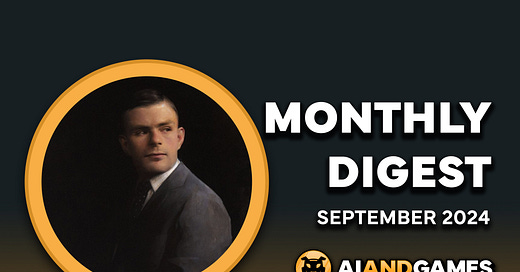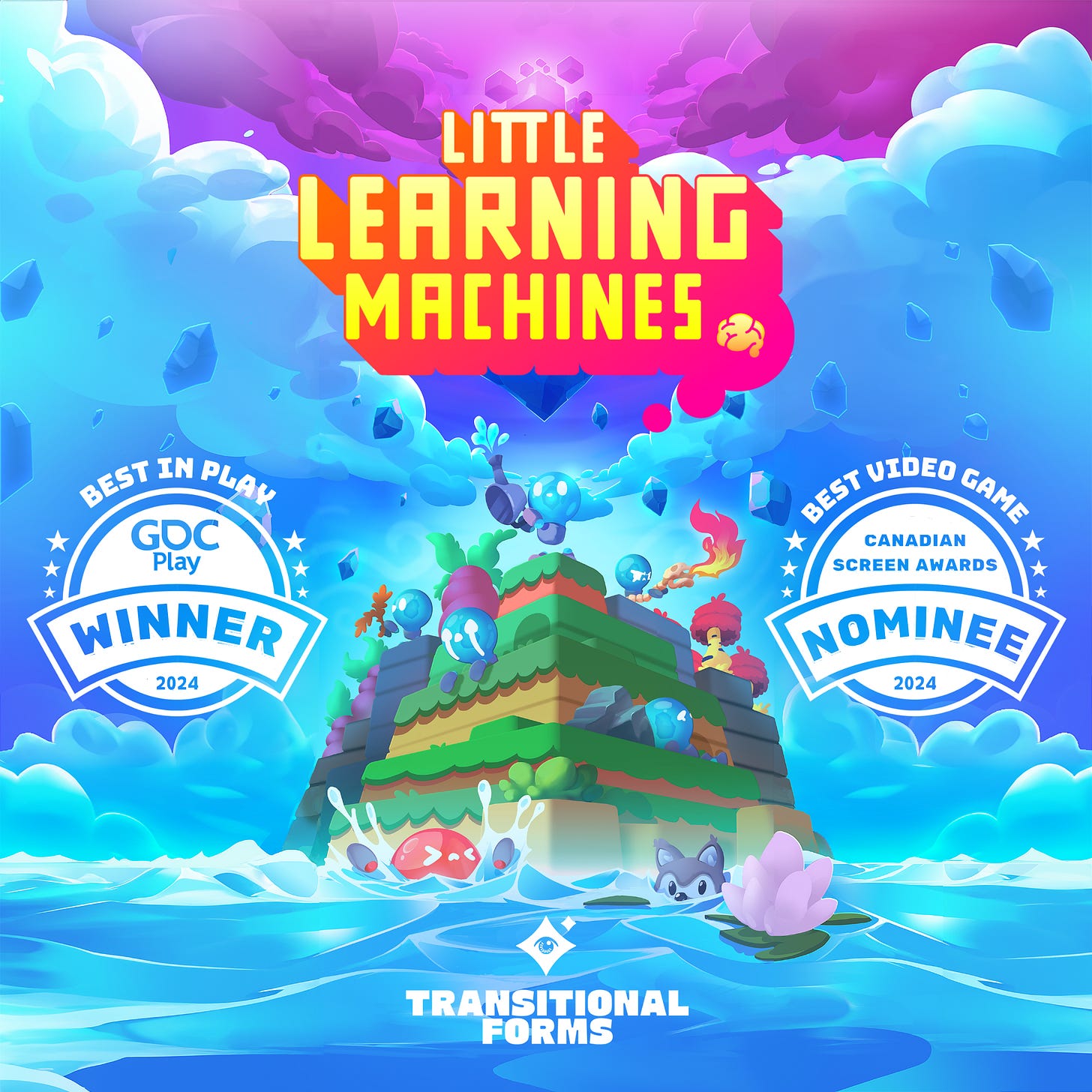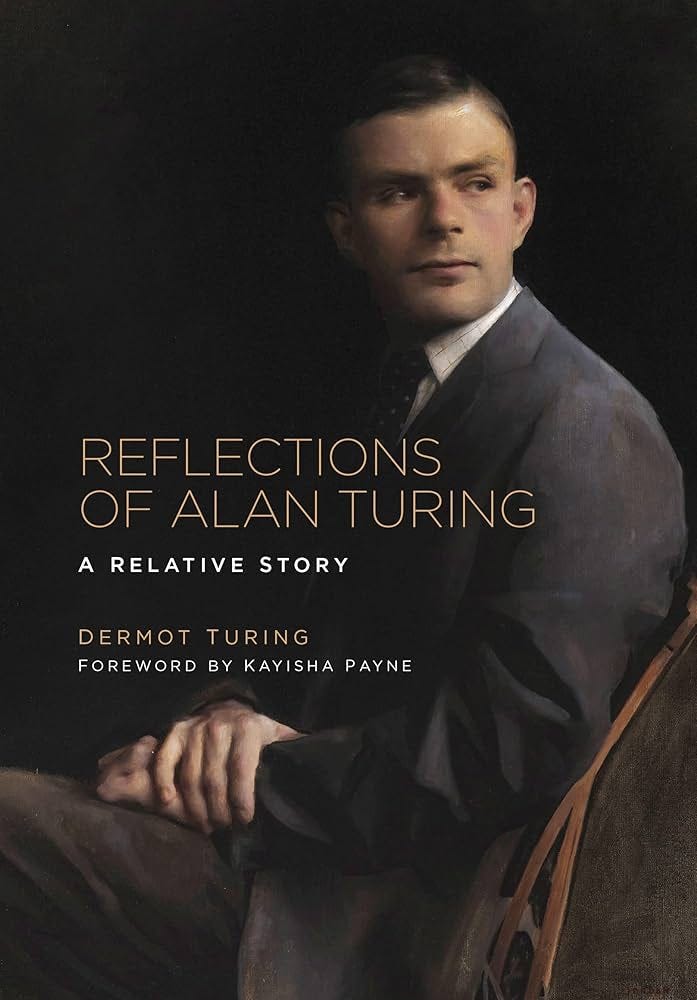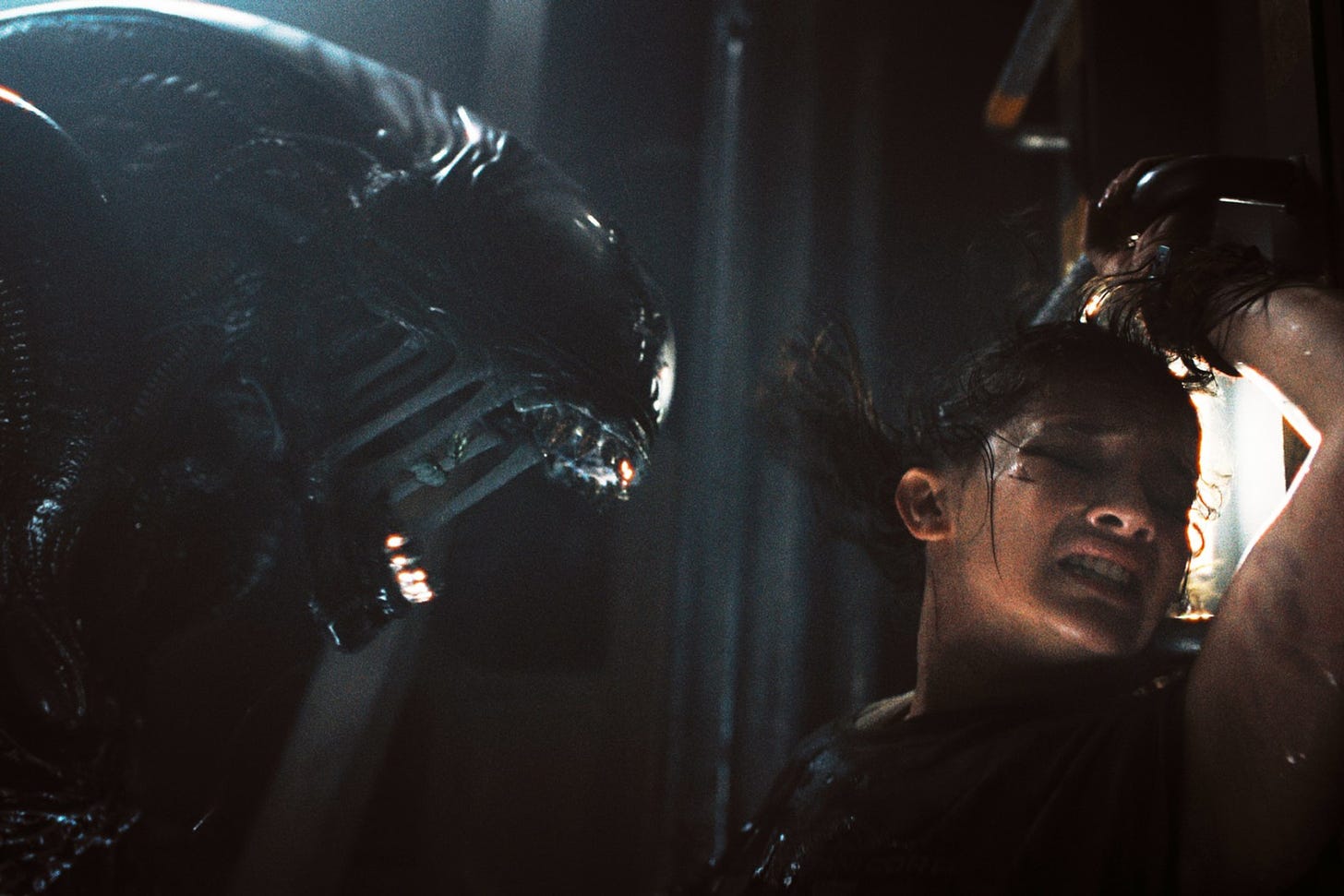Reflections of Turing, Musings on Humanity, and THAT Character Reveal in Alien: Romulus | AI and Games Digest 09/24
Books, games, news, and your questions answered!
Welcome to the AI and Games Digest: a monthly series for paying subscribers where I discuss topics outside of the scope of our regular newsletter. Each issue digs into books, articles, games, and videos that intersect in part, or in full, with the AI and Games remit, plus games I’m playing and answering questions form the community.
You can read part of each digest issue for free, and then catch the rest with a paid subscription to AI and Games.
Hello and welcome to the monthly AI and Games digest, where I take a week to talk about the things that are on my mind, from books to games, articles and more.
With Thanks to our Sponsor
Little Learning Machines!
Once final shout-out for our friends at Transitional Forms to and their game Little Learning Machines! You can still get 40% off the game right now on Steam until September 19th! So get and check it out.
If you’re not familiar already, it’s a game all about training AI characters to solve puzzles. To find out more, be sure to catch last weeks issue of the AI and Games Newsletter, in which we discuss the game in a lot more detail.
Reading and Viewing
Let’s run through a handful of books, articles and otherwise that caught my attention.
Reflections of Turing: A Relative Story
While on vacation I finished reading Reflections of Turing: A Relative Story, which in itself sounds like a bit of mouthful. But it makes a lot more sense once you understand the base premise of it. The book is written by Sir Dermot Turing, the nephew of Alan Turing, and aims to give a deeper and more insightful look into who Alan was as a person, and hold that up aloft against the mythology that has been spun up around him.
In the modern day, when we discuss Alan Turing’s work we typically think of two things:
His research in the nascent fields of computer science and artificial intelligence.
His participation in the code-cracking at Bletchley Park in England, as part of the allied forces efforts to break the encryption of German military communication in World War II.
While his work in computing has been well documented, the latter of course only become public knowledge after the efforts in cracking the Enigma code were de-classified in the 1990s. His notable contributions to science - plus estimates that the work at Bletchley Park may have reduced the period of World War II by two to four years - have only helped build the mythology that surrounds him.
This mythology of course has been further cemented by the narrative that surrounds his untimely death. Turing entered a plea guilty of crimes of ‘gross indecency’ after it came to light he had an intimate relationship with another man in 1952 - the first efforts to decriminalise homosexuality in England and Wales didn’t occur until 1967. This leading to a period of hormone therapy as part of the terms of his probation which lasted for just over a year. In 1954, Turing was found dead in his home in Wilmslow on June 8th, the authorities ruled it as suicide courtesy of cyanide poisoning.
So when we talk about Turing’s life in the modern day it’s often one of a mathematical genius failed by the very government he had worked for in secrecy. Of a man who spent years working behind the scenes in code breaking only for the state to treat him with great indignity, ultimately leading to his death. It’s certainly the narrative I’d been fed over the years when I was introduced to his work at university, and was only further reinforced by the likes of The Imitation Game, the 2014 film starring Benedict Cumberbatch. This book seeks to challenge that in numerous ways.
What makes Reflections of Turing so interesting is that it attempts to re-contextualise a lot of the decisions and the reality behind Turing’s work and life, often pulling from evidence either held by the Turing estate, or by the institutions that he had worked for. While they are related by blood, the author Dermot Turing never met his famous codebreaking uncle. Dermot was born in 1961, seven years after Alan had taken his own life. Furthermore, while one would think he would then have access to a lot of familial insights into Alan and his life, it was often not the case. The Turing’s were a rather insular bunch, and there was clearly differences of opinion across the family towards Alan’s work, his sexual identity, as well as the truth behind his death.
What makes Reflections of Turing so interesting is that it avoids mythologising him, but instead explores his life such that his personality and behaviour make more sense
I found this to be a rather refreshing take on Alan Turing and his career. Seeking not to mythologise him, but instead it explores his life such that his personality and behaviour make more sense. Giving us an insight into how the ongoings of the Turing Baronetcy, notably during the British Raj (the British Crown’s rule of the Indian subcontinent), would have had significant influence on his family composition, his upbringing, and early life. It deals with many facets of his work life, ranging from his relationships with many of the women in his work spheres, to the influence and impact of his work in codebreaking, which while significant is often overexaggerated in historical contexts. Plus it takes great lengths to challenge the narrative established behind his death, notably that the chemical castration he suffered during probation was not a malicious act* by the government, but rather it was a commuted sentence achieved courtesy of his superiors across university and government coming to his defence. Perhaps more tragically, it helps highlight that Alan had completed the hormonal therapy that was his punishment, and that the rationale for his untimely death is less clear cut than previously thought.
*Note that I define ‘malicious’ with regards to the law of the time. It’s clearly a horrible thing to put someone through, and one I neither condone nor wish to see return as a form of punishment within the British legal system. But it was, within the context of the law in the 1950s, perceived as a ‘lesser’ punishment than prison.
As an AI scholar, the part I found most of interest was Dermot’s re-assessment of his uncle’s work in artificial intelligence, how it has been contextualised in contemporary thought, and what Alan would think of the state of AI in the modern day. I’ve often felt personally that the importance Turing test - the notion of computers deceiving humans through interaction - is often exaggerated, and doesn’t really tell us much about the contributions or value of AI systems. Dermot expands on this by discussing that many treating it quite literally, and as a result take the wrong aspects of the test to heart.
All in all, I found the book to be a rather refreshing read, and one that not only provided a unique take on the Turing legacy, but also helped re-shape my perceptions of him that removed some of the broader generalisations of his life that even I had become prone to embracing.
*That* Character Reveal in Alien: Romulus
SPOILER WARNING: If you have yet to see Alien: Romulus, I recommend skipping ahead to the next section. Actually, I’m going to spoil a lot of the Alien franchise here, so yeah, be warned!
A few weeks back I popped down to the local cinema to catch Alien: Romulus, directed by Fede Álvarez. It is the 7th entry of the Alien franchise (9th if you include those horrid Alien vs Predator movies) that acts as an ‘interquel’ to the original Ridley Scott’s Alien from 1979 and James Cameron’s 1986 sequel Aliens.
Personally I enjoyed it for the most part, given we got to see a modern horror director apply their sensibilities to a franchise that has been in dire need of reinvention. That said, I often find the bigger issue with more contemporary Alien titles - 2012’s Prometheus and 2017’s Alien: Covenant - is that they feel compelled to not only make nods towards previous entries in the series, but find ways to tie them all together. As a viewer I am not a fan - and it frustrates me given how pervasive this is in so many franchises in the modern day that don’t necessarily warrant it (*ahem* Star Wars). I’d much rather you create something new that exists in isolation (no pun intended) in the universe that we can also enjoy. Romulus is sadly a victim of this, making the third act not only less interesting, but rather predictable.
And this brings me to that character reveal in Alien: Romulus, how AI was part of the process, and critically why it really didn’t need to be done.
And this brings me to that character reveal in Alien: Romulus, how AI was part of the process, and critically why it really didn’t need to be done.
Keep reading with a 7-day free trial
Subscribe to AI and Games to keep reading this post and get 7 days of free access to the full post archives.









